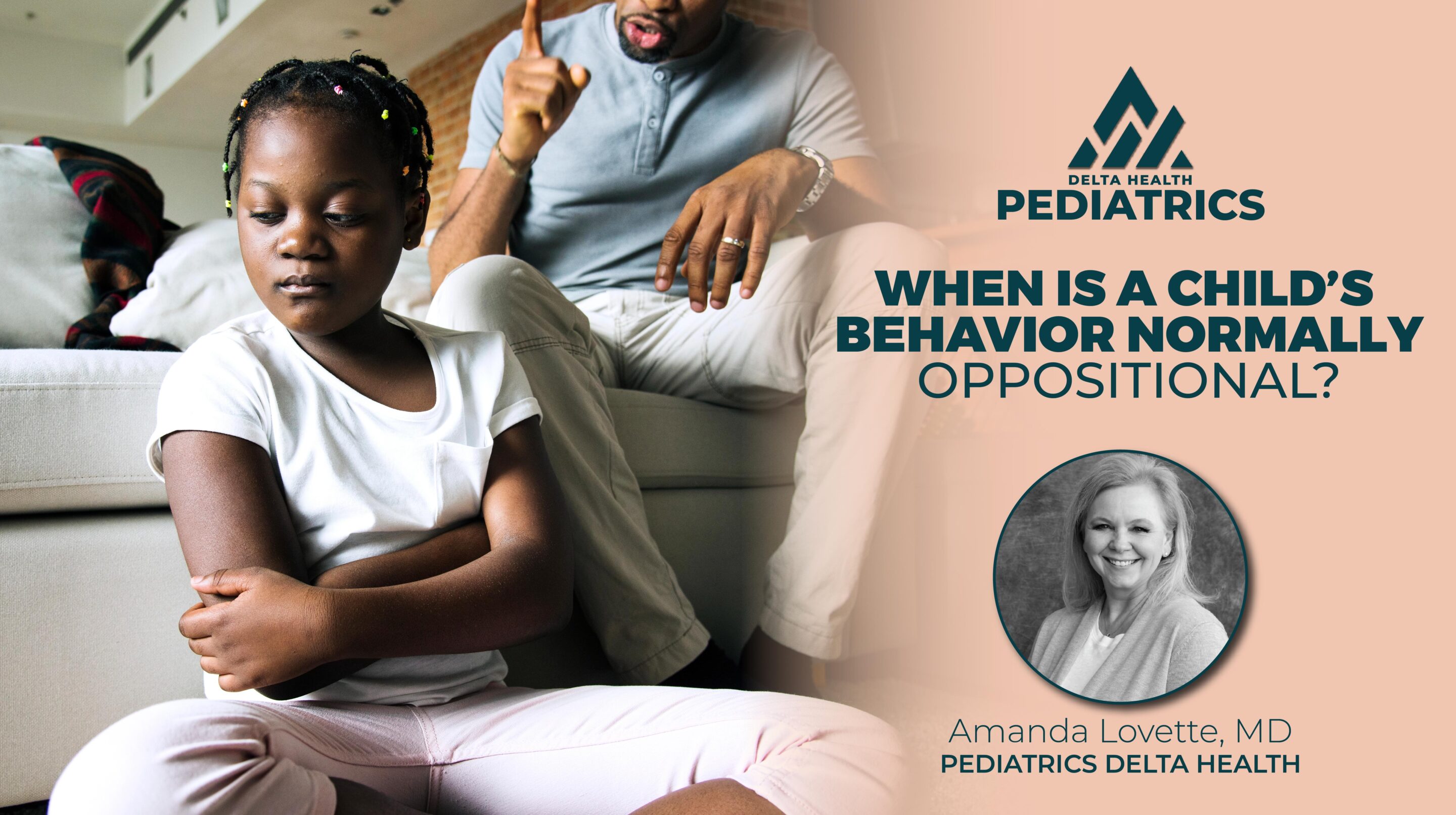Amanda Lovette, MD, Delta Health Pediatrics
As parents, it’s natural to wonder if your child’s oppositional behavior is just a normal part of growing up or something more concerning. All children test boundaries and express defiance at times, but there are instances when this behavior might indicate a more serious issue, such as Oppositional Defiant Disorder (ODD). Understanding the difference between typical childhood behavior and something that may require professional attention is crucial for the well-being of your child and your family.
First, it’s essential to recognize that all children will have moments of oppositional behavior. These moments are a part of normal development and can be seen in various stages, especially during toddler years and adolescence. A two-year-old might throw a tantrum when told to do something they don’t want to do, and a teenager might argue about curfews or homework. These behaviors, while challenging, are expected as children strive for independence and self-expression.
However, when oppositional behavior becomes a persistent pattern and interferes with a child’s social, educational, or family life, it might be more than just typical defiance. The key is to look at the frequency, intensity, and duration of the behavior. If your child is consistently angry, argumentative, and vindictive, and this behavior lasts for at least six months, it might be time to take a closer look.
One of the hallmark signs of ODD is a consistent display of at least four symptoms from the following categories: angry or irritable mood, argumentative or defiant behavior, and vindictiveness. This might include frequent temper tantrums, excessive arguing with adults, actively defying requests or rules, deliberately trying to annoy others, blaming others for their mistakes or misbehavior, being easily annoyed, and showing anger or resentment. If these behaviors are present and impacting your child’s daily life, it could be indicative of ODD.
It’s also important to consider the context in which these behaviors occur. If your child is only oppositional in specific settings, such as at home but not at school, it might suggest different underlying issues, such as family stress or conflict. Conversely, if the behavior is consistent across all settings, this could be a stronger indicator of a deeper issue.
Understanding the impact of the behavior on your child’s life is crucial. Oppositional behavior that disrupts their ability to function in school, maintain friendships, or participate in family activities is a red flag. For example, if teachers report ongoing issues with defiance, or if your child frequently loses friends due to their behavior, these are significant concerns.
It’s essential not to jump to conclusions or diagnose your child on your own. If you have concerns about your child’s behavior, seeking professional help is a critical step. A mental health professional can provide a comprehensive evaluation to determine whether your child’s behavior falls within normal limits or if it indicates a disorder such as ODD. Early intervention can make a significant difference, providing strategies and support to help your child manage their behavior and improve their quality of life.
While dealing with oppositional behavior can be incredibly challenging and exhausting for parents, it’s important to approach the situation with patience and understanding. Children exhibiting these behaviors are often struggling with their emotions and may not fully understand why they are acting out. Building a strong, supportive relationship with your child, setting clear and consistent boundaries, and seeking professional guidance can help navigate these difficulties.
In summary, while oppositional behavior is a normal part of childhood development, persistent and pervasive patterns of defiance, anger, and vindictiveness that impact a child’s daily life may indicate a more serious issue like ODD. Recognizing the signs, understanding the context, and seeking professional help are essential steps in ensuring your child receives the support they need. If you’re concerned about your child’s behavior, don’t hesitate to reach out to a healthcare professional to explore your options.
For more information, contact Delta Health Pediatrics at 970.546.4000 or visit deltahealthco.org/delta-health-pediatrics/. Delta Health Pediatrics has walk-in appointments available Tuesdays, Wednesdays and Fridays from 8:00 a.m. to 5:00 p.m. as well as same-day appointments Monday through Friday. Please call the clinic to schedule an appointment.
More tips, articles and videos from Dr. Lovette can also be found online by joining the Healthy Kids Western Slope Facebook Group at facebook.com/groups/healthykidswesternslope/.


